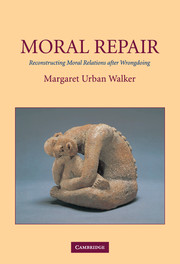3 - Damages to Trust
Published online by Cambridge University Press: 05 June 2012
Summary
In a scene in the David Mamet movie House of Games a confidence man, Mike, gives Dr. Margaret Ford, a psychiatrist who specializes in obsessive-compulsive disorders, a lesson in the “short con” at a Western Union office. When another man enters to receive money by wire, Mike strikes up a conversation, claims to be a fellow (former) Marine, and insists that if his money arrives first he will advance the other man the money for which he is waiting in order to return to camp. Before long, the Marine offers Mike the same help in return: he, too, is happy to advance Mike the money if his arrives first. Mike lets his pigeon off at that point, because the con is only a demonstration of a principle he is teaching the doctor. Mike is a “confidence man,” he explains to Margaret, not because you – the mark – give him your confidence but because he – the confidence man – gives you his. It's the confidence man's simulation of trust in the mark that provokes trust in return. Mike is skilled in triggering trusting responses in people so that they are likely to do what he wants them to do. What he wants them to do, ultimately, is to give him their money. In the end, this short con is embedded in a longer one: Mike is setting up Margaret. He shares “secrets,” seduces her, and ropes her into willing complicity, all with the aim of taking her money.
- Type
- Chapter
- Information
- Moral RepairReconstructing Moral Relations after Wrongdoing, pp. 72 - 109Publisher: Cambridge University PressPrint publication year: 2006
- 3
- Cited by



